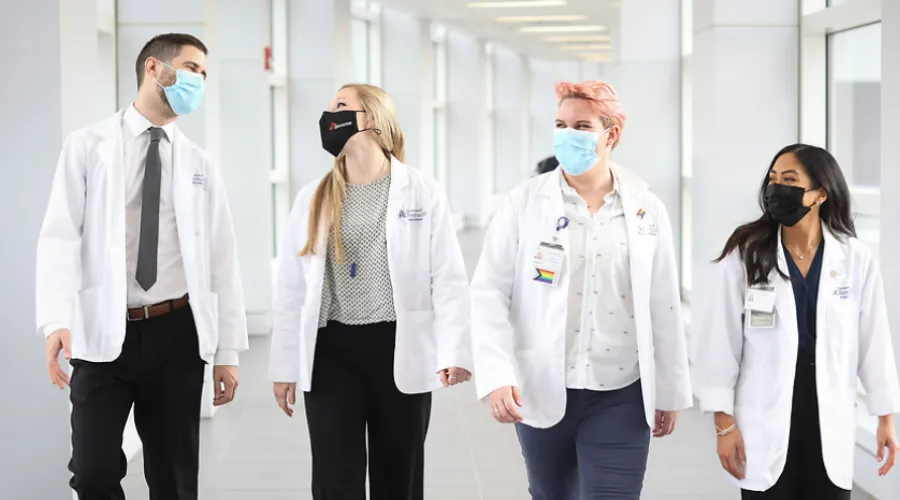
Characteristics of Successful Applicants
The AAMC’s premedical competencies highlight expectations for medical school applicants under three subcategories: professional, science, and thinking and reasoning.
Source: Premed Competencies for Entering Medical Students
Competencies
Professional Competencies
Commitment to Learning and Growth
Practices continuous personal and professional growth for improvement, including setting and communicating goals for learning and development; reflects on successes, challenges, and mistakes; pursues opportunities to improve knowledge and understanding; and asks for and incorporates feedback to learn and grow.
Cultural Awareness
Appreciates how historical, sociocultural, political, and economic factors affect others’ interactions, behaviors, and well-being; demonstrates a desire to learn about different cultures, beliefs, and values.
Cultural Humility
Seeks out and engages diverse and divergent perspectives with a desire to understand and willingness to adjust one’s mindset; understands a situation or idea from alternative viewpoints; reflects on one’s values, beliefs, and identities and how they may affect others; reflects on and addresses bias in oneself and others; and fosters a supportive environment that values inclusivity.
Empathy and Compassion
Recognizes, understands, and acknowledges others’ experiences, feelings, perspectives, and reactions to situations; is sensitive to others’ needs and feelings; and demonstrates a desire to help others and alleviate others’ distress.
Ethical Responsibility to Self and Others
Behaves with honesty and integrity; considers multiple and/or conflicting principles and values to inform decisions; adheres to ethical principles when carrying out professional obligations; resists pressure to engage in unethical behavior; and encourages others to behave honestly and ethically.
Interpersonal Skills
Demonstrates an awareness of how social and behavioral cues affect people’s interactions and behaviors; adjusts behaviors appropriately in response to these cues; recognizes and manages one’s emotions and understands how emotions impact others or a situation; and treats others with dignity, courtesy, and respect.
Oral Communication
Effectively conveys information to others using spoken words and sentences; actively listens to understand the meaning and intent behind what others say; and recognizes potential communication barriers and adjusts approach or clarifies information as needed.
Reliability and Dependability
Demonstrates accountability for performance and responsibilities to self and others; prioritizes and fulfills obligations in a timely and satisfactory manner; and understands consequences of not fulfilling one’s responsibilities to self and others.
Resilience and Adaptability
Perseveres in challenging, stressful, or ambiguous environments or situations by adjusting behavior or approach in response to new information, changing conditions, or unexpected obstacles, and recognizes and seeks help and support when needed; recovers from and reflects on setbacks; and balances personal well-being with responsibilities.
Service Orientation
Shows a commitment to something larger than oneself; demonstrates dedication to service and a commitment to making meaningful contributions that meet the needs of communities.
Teamwork and Collaboration
Collaborates with others to achieve shared goals and prioritizes shared goals; adjusts role between team member and leader based on one’s own and others’ expertise and experience; shares information with team members and encourages this behavior in others; and gives and accepts feedback to improve team performance.
Professional Competencies
Commitment to Learning and Growth
Practices continuous personal and professional growth for improvement, including setting and communicating goals for learning and development; reflects on successes, challenges, and mistakes; pursues opportunities to improve knowledge and understanding; and asks for and incorporates feedback to learn and grow.
Cultural Awareness
Appreciates how historical, sociocultural, political, and economic factors affect others’ interactions, behaviors, and well-being; demonstrates a desire to learn about different cultures, beliefs, and values.
Cultural Humility
Seeks out and engages diverse and divergent perspectives with a desire to understand and willingness to adjust one’s mindset; understands a situation or idea from alternative viewpoints; reflects on one’s values, beliefs, and identities and how they may affect others; reflects on and addresses bias in oneself and others; and fosters a supportive environment that values inclusivity.
Empathy and Compassion
Recognizes, understands, and acknowledges others’ experiences, feelings, perspectives, and reactions to situations; is sensitive to others’ needs and feelings; and demonstrates a desire to help others and alleviate others’ distress.
Ethical Responsibility to Self and Others
Behaves with honesty and integrity; considers multiple and/or conflicting principles and values to inform decisions; adheres to ethical principles when carrying out professional obligations; resists pressure to engage in unethical behavior; and encourages others to behave honestly and ethically.
Interpersonal Skills
Demonstrates an awareness of how social and behavioral cues affect people’s interactions and behaviors; adjusts behaviors appropriately in response to these cues; recognizes and manages one’s emotions and understands how emotions impact others or a situation; and treats others with dignity, courtesy, and respect.
Oral Communication
Effectively conveys information to others using spoken words and sentences; actively listens to understand the meaning and intent behind what others say; and recognizes potential communication barriers and adjusts approach or clarifies information as needed.
Reliability and Dependability
Demonstrates accountability for performance and responsibilities to self and others; prioritizes and fulfills obligations in a timely and satisfactory manner; and understands consequences of not fulfilling one’s responsibilities to self and others.
Resilience and Adaptability
Perseveres in challenging, stressful, or ambiguous environments or situations by adjusting behavior or approach in response to new information, changing conditions, or unexpected obstacles, and recognizes and seeks help and support when needed; recovers from and reflects on setbacks; and balances personal well-being with responsibilities.
Service Orientation
Shows a commitment to something larger than oneself; demonstrates dedication to service and a commitment to making meaningful contributions that meet the needs of communities.
Teamwork and Collaboration
Collaborates with others to achieve shared goals and prioritizes shared goals; adjusts role between team member and leader based on one’s own and others’ expertise and experience; shares information with team members and encourages this behavior in others; and gives and accepts feedback to improve team performance.
Science Competencies
Human Behavior
Applies knowledge of the self, others, and social systems to solve problems related to the psychological, sociocultural, and biological factors that influence health and well-being.
Living Systems
Applies knowledge and skill in the natural sciences to solve problems related to molecular and macro systems, including biomolecules, molecules, cells, and organs.
Science Competencies
Human Behavior
Applies knowledge of the self, others, and social systems to solve problems related to the psychological, sociocultural, and biological factors that influence health and well-being.
Living Systems
Applies knowledge and skill in the natural sciences to solve problems related to molecular and macro systems, including biomolecules, molecules, cells, and organs.
Thinking and Reasoning Competencies
Critical Thinking
Uses logic and reasoning to identify the strengths and weaknesses of alternative solutions, conclusions, or approaches to problems.
Quantitative Reasoning
Applies quantitative reasoning and appropriate mathematics to describe or explain phenomena in the natural world.
Scientific Inquiry
Applies knowledge of the scientific process to integrate and synthesize information, solve problems, and formulate research questions and hypotheses; is facile in the language of the sciences and uses it to participate in the discourse of science and explain how scientific knowledge is discovered and validated.
Written Communication
Effectively conveys information to others by using written words and sentences.
Thinking and Reasoning Competencies
Critical Thinking
Uses logic and reasoning to identify the strengths and weaknesses of alternative solutions, conclusions, or approaches to problems.
Quantitative Reasoning
Applies quantitative reasoning and appropriate mathematics to describe or explain phenomena in the natural world.
Scientific Inquiry
Applies knowledge of the scientific process to integrate and synthesize information, solve problems, and formulate research questions and hypotheses; is facile in the language of the sciences and uses it to participate in the discourse of science and explain how scientific knowledge is discovered and validated.
Written Communication
Effectively conveys information to others by using written words and sentences.
Applicant Characteristics
In the individual assessment of each applicant, the UK College of Medicine prioritizes other attributes that reflect our mission. Although not essential, certain applicant characteristics will enhance their potential to contribute to the college and to the profession of medicine:
- Commitment to the State: As a state medical school, the UK College of Medicine gives preference to Kentucky residents. Non-residents who have strong ties to the state (e.g. previous attendance at a Kentucky college or university) may be considered. Regardless of their state of residency, only applicants who are U.S. citizens or permanent residents are considered. International applicants who graduated from a Kentucky high school or attended (or are attending) a Kentucky college/university may be considered as well.
- Commitment to Underserved Populations: Certain geographic areas (rural Appalachian counties) and patient populations (low socioeconomic status, underrepresented minority) have challenges in receiving safe, effective, patient-centered, timely, efficient, and equitable health care. The UK College of Medicine values individuals who have demonstrated interest in serving these areas or populations in the future.
- Commitment to a Collaborative Learning Environment: The UK College of Medicine fosters a collaborative environment where students can gain a broad understanding of various perspectives, enhancing both their medical education and ability to provide patient-centered care. We strive to create a class that reflects the people of Kentucky, considering applicants’ educational backgrounds, life experiences, and socioeconomic factors. The University is committed to maintaining a welcoming environment for all, where students have the opportunity to learn from one another and prepare to serve patients with unique and varied needs. The University will not discriminate based on race, color, ethnic origin, national origin, creed, religion, political belief, sex, sexual orientation, gender identity, gender expression, pregnancy, marital status, genetic information, or age.
